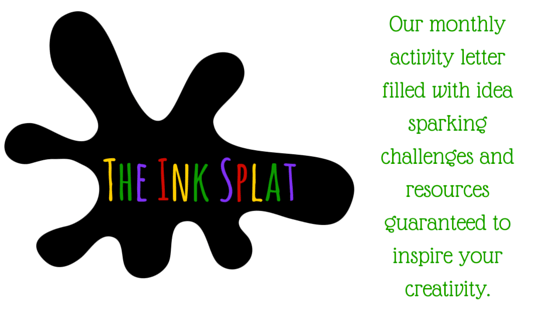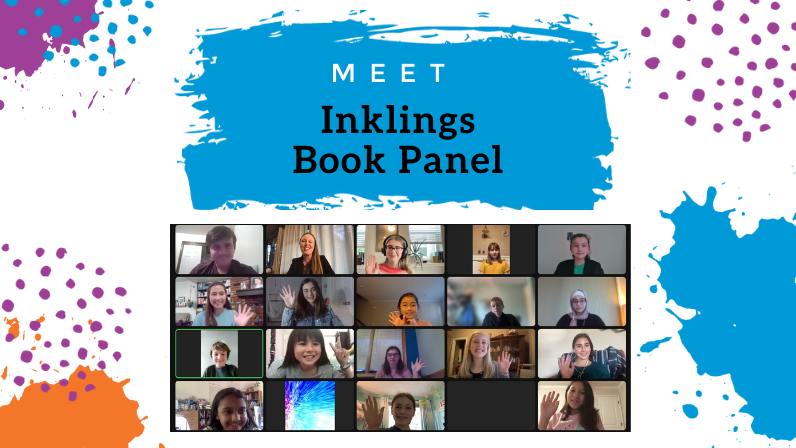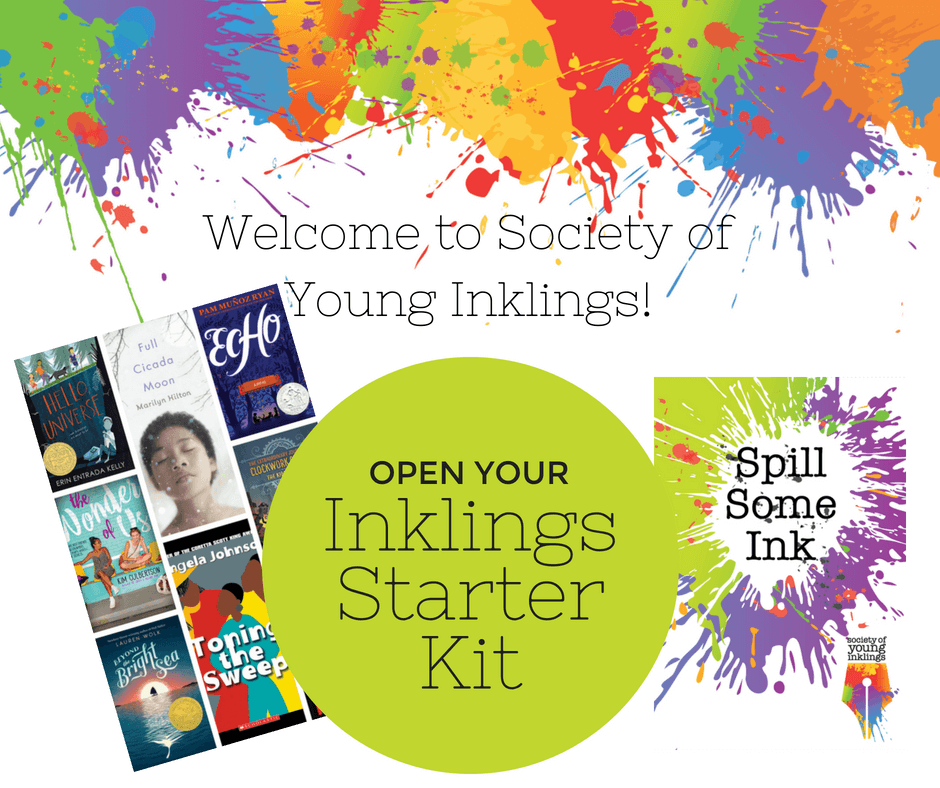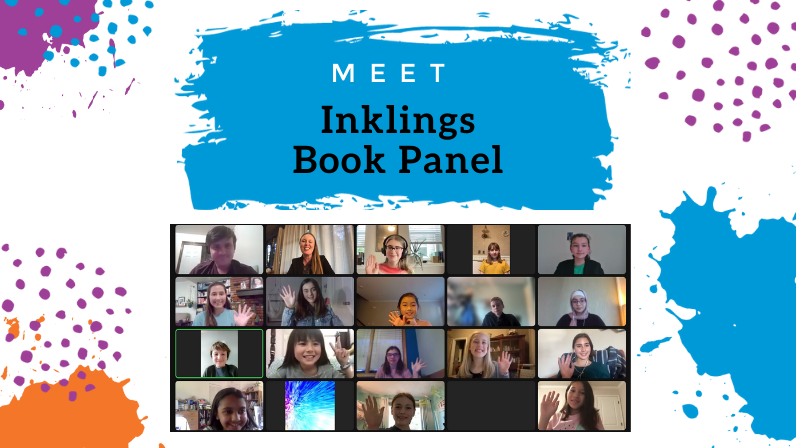In the July issue of Ink Splat, we asked our Inklings Book Contest winners to share their thoughts and tips on writing with us. Henley reminds us of how important advice from others is: “It’s really awesome to get advice from anyone, especially your mentor or, in the future, your editor. But always remember that it’s your story no matter what, and you’re always in charge of all the changes that happen in it.”

Writing Challenge
Our writing challenge for this month comes from IBC Winners Panelist, Mariam Osman:
Imagine you are stuck on a desert island and write a diary entry of your first day on the Island. What will you miss, and why? Also, is there anything in your life that you took for granted?

An Interview with Inklings Book Panel
The interview this month is a Q & A from our very own Inklings Book Contest winners! Here’s your chance to soak up some inspiration and encouragement for your own writing journey.
On the most enjoyable part of writing:
“My favorite part of the writing process is going back over my first draft to revise my story and make the writing stronger. It sometimes helps to get a little distance from what I’ve written, and then revisit it and be open to finding new ways to make my writing clearer.” –Aidan Felt
“My favorite part is creating interesting characters and describing the scenery.”—Noelle Torgerson
“I like the playing-with-words part because I like making the story more powerful. This time it was about the sensory details. And it made me realize how much it plays a part in the story.” –Mariam Osman
On getting ideas and beginning:
“I just think for a while, and I have a really hyperactive mind. So sooner or later, I’m going to think of something, and then, somehow, I’ll be able to turn that into a good idea. Or I’ll find something, or I’ll look at something, and think, ‘I should write something about that.’”—Nova Macknick Conde
“I always start with the question “what if.” And then see where the answer takes me.”—Molly Felt
“I think it works best to first make sure you can see your environment and your characters in your head. Because from there, you can let the story take itself away, and you just have to write it down.”—Lydia Wedan
On what they’ve learned as a writer:
“Go slowly, specifically for poetry. It’s something that’s meant to be explored. Even for prose or short stories, if you’re writing manically, I don’t think it’ll help you. Take into consideration the words you’re writing.”—Camden DeOliveira
“I have two pieces of advice. One, your writing will never be perfect. And if you have an idea that you’ve paused and thought about so much that it’s to the point where you can’t even write it down because you’re scared that it won’t be good enough, that gets you nowhere. Even just writing it down and hating it is better than not writing anything down at all. And my second piece of advice is that writing will always be cool.”—Danica Richey
“It’s really awesome to get advice from anyone, especially your mentor or, in the future, your editor. But always remember that it’s your story no matter what, and you’re always in charge of all the changes that happen in it.”—Henley Ferguson
“I would personally suggest that you don’t plan out too much before you do it. The joy can be taken out of it with planning, just see where it takes you. I know that a lot of people need some planning, but don’t stress over too much planning.”—Steven Cavros
“My advice is to never get rid of your writing, ever. Even if you really don’t like it, just save it and put it off to the side, you might want to come back to it. But never get rid of it.”—Amelia Pozzo
“One of my best tips is to do a lot of experimentation with your writing, like write from a different character’s point of view. Do lots and lots of different genres, even the ones that you think you’re not going to like.”—Naomi Pond
On dealing with writer’s block or feeling stuck:
“What I found really useful was just writing the absolute worst that I can that is still related to the prompt, and then going back over and over it, fixing it again and again. That’s what I feel is most effective in those situations where I feel very intimidated by the blank page.”—Iago Macknick-Conde
“Just be patient with yourself. And you have to have an open mind. Sometimes I just can’t find a way to transition from the thing I was talking about before into the thing that I want to talk about. But my mentor taught me strategies to fill in certain parts, or move the story along smoother by taking out certain words and just putting in what you want to say. And from then on, just work around it until it reads the way that you want it to.”—Lily Tuvi
“What I do when I get writer’s block is to usually go back to my inspiration. Like, in the moonrock poem, I went on a moonwalk while I was making this poem because I just hit a point where I didn’t think I could go any further. So I went back to my inspiration, and it just really helped me finalize my poem and get it ready to submit.”—William Miller
What’s a challenge you’ve faced as a writer, and how did you overcome it?
“A challenge that I face is during the end of my poem or short story because I have a bunch of stories that I started, and then I don’t really have an ending for them. So how I face it is, basically, I think of a bunch of writings and see which one would make most sense with everything else that happens before it.”—Caroline Cui
“Do not change the first word that comes to you. Because that’s probably the main word you’re supposed to stick with. It’s like a message that’s telling you that if you don’t incorporate that, or weave it into your poem in some way, make that the main idea of your poem, then your poem’s not going to sound like it came from you.”—Phoebe Wagner
Stay tuned for the release of the Inklings Book next month!

INKLINGS CELEBRATE
Join us for Summer Camp!
We’re inviting passionate young writers to join us on Zoom for writerly summer camp experiences. Each camp will include skill-building activities, time for drafting, and collaboration with peers.
Upcoming at Inklings
MAY
- Register for Inklings summer programs like 1-on-1 Mentorship, Young Author's Studio Summer Camps, and Inklings Membership
- Details coming soon for our Student Showcase events
JUNE
- 6/10-13: World Creation 101 and I Am the Story Summer Camps
- 6/17-20: Playwriting and Design a Novel Summer Camps
- 6/24-27: Reality Hunger and Literature in Miniature Summer Camps
JULY
- 7/8-11: Intro to Fiction Summer Camp
- 7/22-25: Intro to Poetry and Make Your Scenes Sparkle Summer Camps
AUGUST
- 8/5-9: Filmmaking as Dialogue and Editing and Revising Fiction Summer Camps
SPARK YOUR CREATIVITY!
As a bonus gift, we’ll send you an Inklings Starter Kit packed with creativity-sparking fun.



